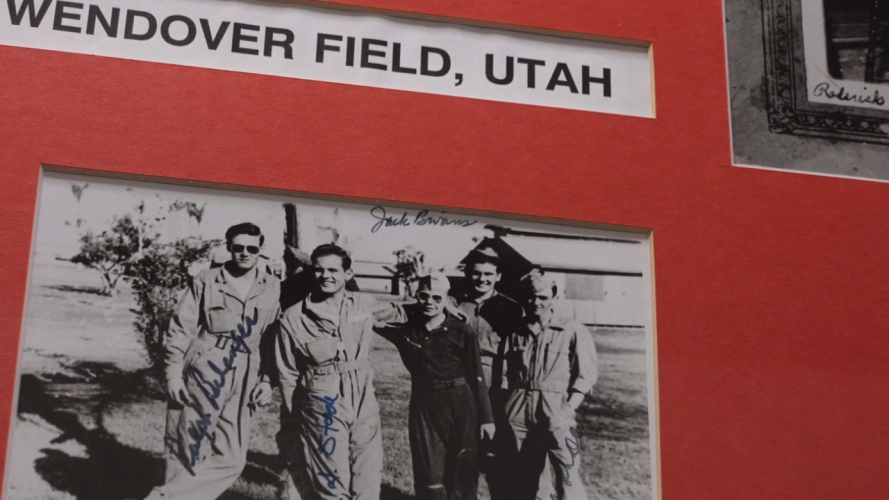WENDOVER, Utah — August 6 marks 80 years since the first time an atomic bomb was ever used, when the Enola Gay, a B-29 Super Fortress, dropped the atomic bomb "Little Boy" on Hiroshima, and then three days later dropped the second bomb on Nagasaki.
The historic Wendover Airfield was the training ground for those missions. Eighty years ago, the crews took off from Utah to fly towards Japan.
But on Wednesday, two pilots returned, who 80 years ago no one could have predicted would become friends.
Jim Peterson, the President of the Historic Wendover Airfield Foundation, said, "Today is a rather momentous day in history." He noted that Wendover played "rather an unknown role" in the Manhattan Project.
While that unknown role wasn’t on display, on August 6th, 1945, the world would find out with the bomb dropped on Hiroshima then again on Nagasaki.
The Wendover Historic Airfield stands today, 80 years later, as a reminder of what was. Peterson remarked, "There really is nowhere you can go other than Wendover that has the number of World War II original buildings.”
Jim Peterson is the one behind the museum, having built it back from nothing. "When I very first came out here, this place did look like it was supposed to be bulldozed. Being able to just have this here for future generations—that's a reward.”
If you want to see more about the museum watch this video:
But Wednesday was also a reminder of what can be with those 2 pilots I mentioned earlier.
Shinji Maeda and Adrian Eichhorn’s journey together began with missions to fly around the world. Eichhorn said, "I flew my 1962 Beechcraft Bonanza around the world. Shinji reached out to me.”
Maeda added, "So if he could do that, maybe I could do that.”
Initially, Eichhorn was skeptical. "At first, I kind of blew him off because he didn't have an airplane.”
Maeda reflected, "So I was like, oops.”
But after building a plane of his own, Shinji eventually accomplished his mission, with Adrian’s help overcoming incredible challenges.
He shared, "Back in 1998, when I was 18 years old, a car accident dramatically changed my life, and people called me handicapped. You cannot do anything that is impossible.”
Shinji lost the use of his eye in that crash, and in Japan, it would never have allowed him to become a pilot. However, in America, he got a second chance with the help of Adrian.
Now, standing together and dressed exactly alike, Eichhorn explained, "This is my attire, especially when it's 100 degrees outside,” jokingly.
The pair exemplify a friendship that their relatives could have never dreamed of.
Eichhorn said, "There were times that we would talk about any number of subjects. Then I thought, you know, let's talk about Hiroshima and Nagasaki. My dad was born in Germany, became a US citizen, and then flew bombing missions right at the tail end of the war.”
Maeda added, "On my mom's side, my grandpa fought in World War II”
“So you had relatives on both sides fighting each other.” I asked them with both of them nodding in agreement.
This makes today incredibly important, as Eichhorn stated, "Think of all the service members that were here enjoying and then left, and a lot of them never came back.”
That’s why they took a flight in formation over the area that was responsible for the weapons that ended those countries' conflicts.
Maeda noted, "What we're doing is just paying it forward. What do we got based on those people who sacrificed for both countries?”
Their planes then came to rest inside the hangar that housed the B-29s that completed those missions. Maeda remarked, "So 80 years ago, having this friendly conversation was impossible.”
With their relationship starting from mentoring, it grew into friendship, and eventually, best friends and brothers, even dancing partners. Eichhorn joked, "Shinji asked me to dance. I think we need the music.”
Their bond serves as an example of how the world can learn with Maeda posing a simple question: "Why don’t people learn from history?”
Eichhorn added, "So we don't repeat what happened in the past.”
Peterson emphasized the same thing by adding , "The sacrifices of the people during that time need to not be forgotten. It's important for us to understand what happened. As far as I'm concerned, we don't ever want it to happen again.”




